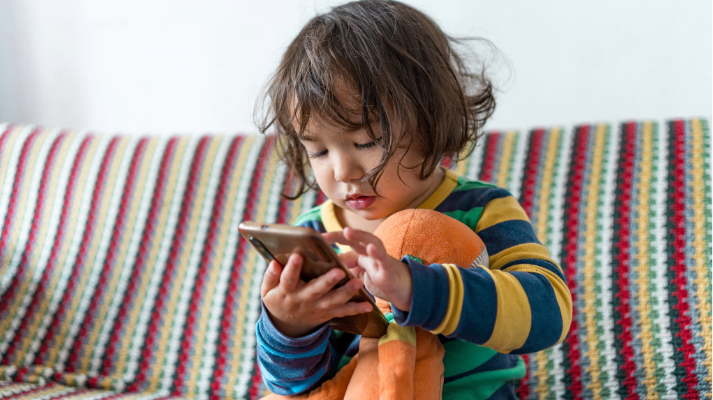By Steve and Candice Watters
Recently we interviewed Clare Morell about her new book The Tech Exit. In the following portion of our conversation, Morell talks about the dangers screens pose for children, and the many problems parental controls can’t solve.
Steve Watters: We often hear from parents that invasive technology and digital developments are affecting their ability to disciple their children. What are the threats you see parents facing from the various screen temptations surrounding children today?

Clare Morell: It’s twofold. The first is the content that’s accessible to children through smartphones, tablets, computers, and social media. The nature of social media platforms and the app-based ecosystem has made it incredibly difficult for parents to effectively lock down a device. There are hundreds of apps, and every app is a portal to the internet. Many parental controls can’t even block what’s happening within an app’s internal browser.
For example, a child could click through to a pornographic site like Pornhub inside the Snapchat app without ever leaving the app. Most parents don’t even realize that’s possible. Kids can very easily stumble upon dangerous, violent, and inappropriate content.
Apps can also open the door for predators. Parents often have a false sense of safety because they see their child sitting right there on the couch on the iPad. But when you hand a child a device, you’re giving the entire world access to them.
Even seemingly innocent apps can be dangerous. I mention the YouVersion Bible App, where predators used the direct messaging and Scripture-sharing features to send sexually explicit images to children. Parents thought their kids were just spending time in a Bible app and had no idea this was happening.
The deeper issue I raise with parents is that the technology itself is designed to be addictive. It creates cravings and compulsions. No screen time limit is ever “enough.” The medium is the message—it’s not just what children see, but what the technology is teaching them by its very design.
It catechizes children into a way of life that says “life exists for your entertainment, your individualized pleasure.” The smaller the screen, the more isolated the experience–the algorithm learns your preferences and feeds you exactly what will keep you hooked. This communicates a very shallow purpose for life—one that runs completely counter to Christian teaching. As Christian parents, we’re trying to teach our children to love and know God, and to love and serve others. But the screen tells them the world revolves around them—their likes, their followers, their self-expression, their pleasure.
I worry that some Christian parents think, “If I just put screen time limits and parental controls in place, then everything will be fine.” But I want to encourage them to think deeper. The design and nature of these technologies are communicating something to children that’s in direct opposition to the spiritual training Christian parents are trying to give.
SW: What other dangers do screens pose to children?
CM: Screens are harmful to developing brains. There’s increasing evidence connecting screen time with symptoms like ADHD and autism, and how screens can dysregulate a child’s nervous system. They interfere with emotional development and self-control.
New research from the University of North Carolina shows that kids who frequently check social media have brains that become more sensitive to social rewards—more so than is developmentally healthy. It’s literally rewiring how their brains are motivated and how they process feedback. This should be alarming to parents. The physiological effects of screen exposure are real—and some of them may be reversible, but some may not be.
While there’s growing awareness of harmful content, many parents think, “Okay, we’ll use parental controls.” But in the book, I explain the limits of those controls—and the deeper issue.
The mental health crisis is also very well documented—Jonathan Haidt has done a lot of work on this. But it’s heartbreaking. We’re seeing sharp increases in anxiety, depression, suicide, self-harm, and eating disorders among teenagers.
Something is clearly going on with screens, and we need to take it seriously.
Candice Watters: How are parents responding to all of this?
CM: I don’t have hard data, but I can tell you what I’ve observed, and part of that is why I wrote the book. Most Christian parents I talk to agree that smartphones are harmful—but the phone just became inevitable.
Our decisions about technology should not look like the culture’s. I want my children to have friends—but I want to help them build real friendships, not ones mediated by smartphones. So it’s not, “I won’t give you a phone because I don’t want you to have friends.” It’s, “I do want you to have friends—and I’m going to help you build those friendships differently.”
That mindset shift is key. And I’ll be honest—it’s one of the greatest challenges for Christian parents. But I know a lot of Christian families—especially in my generation—with young kids who are increasingly choosing not to do smartphones or social media.
We’ve had the benefit of seeing the data, the consequences, and we’ve had time to plan ahead. I’ve even seen a generational divide in the church—some families with older teens gave their kids smartphones, while others really resisted. But among younger families, the conviction against it seems stronger and more widespread.
Read Part 2 of our interview to see how Morell is helping parents get their kids off of screens with Fasting and Feasting.







